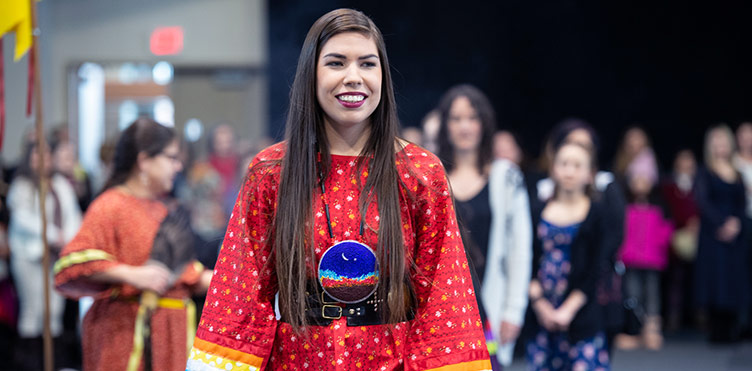
Amanda Reid Rogers was installed as Piluwitahasuwin at UNB on Feb. 21, following a traditional celebration on the Fredericton campus.
Rogers was announced as UNB’s first Piluwitahasuwin (assistant vice-president Indigenous engagement) last November. Piluwitahasuwin, pronounced BILL-WEE-DUH-HUZZ-WIN, is a Wolastoqey word meaning “one who promotes change in a good way toward truth.”
The traditional celebration, entitled Piluwitahasuwawsuwakon: Forging a New Path, officially installed Rogers to the position.
“Reflecting on this historic moment for UNB, the installation ceremony is an envisioning exercise for all those involved as well as a sacred commitment to piluwitahasuwawsuwakon,” says Rogers. “In Waponahki territory, I have learned from many teachers that each person is born with a gift. This position gives me the opportunity to work meaningfully and collaboratively to reshape the university setting into one where Indigenous students may see it as a place to acquire a higher level of education that nurtures their inherent gifts.”
The installation ceremony is required to maintain traditional Wolastoqey protocol related to sacred responsibilities. The event included a sacred pipe ceremony, a water ceremony, dancing and drumming, and the presentation of a wampum. Rogers received a Sacred Bundle, a wrapped collection of sacred items, which will be passed on to her successor.
The position of Piluwitahasuwin reports directly to the President’s Office and will promote and expand Indigenous culture and opportunities on UNB campuses and within the community.
“It is truly a momentous occasion to install the first Piluwitahasuwin at UNB,” says UNB President Eddy Campbell. “As leaders in education, we have important work ahead of us in responding to the Truth and Reconciliation Commission’s calls to action. This is a ground-breaking step forward for UNB in its commitment to reconciliation and reconcili-action with Indigenous communities.”
The establishment of the Piluwitahasuwin was identified as a priority in UNB’s Truth and Reconciliation Strategic Action plan, released in March 2018 and recognized as a Sacred Bundle.
Piluwitahasuwin shares roots with piluwitahasuwawsuwakon, a Wolastoqey word that means “allowing your thinking to change so that action will follow in a good way toward truth.”
Rogers, RN, is Dakota-Sioux with family and community connections in Wolastokuk. Currently a course instructor and master’s student in nursing, she is using a community-based collaborative participatory action research approach for her thesis that is focused on the experiences of Wolastoqey women who are descendants of survivors of the Indian residential school experience in Canada.
“In order to nurture Indigenous students and their gifts, it is critical for Canadians to understand treaty relationships, as well as respect skicinuwey (Indigenous) ways of learning, knowing, and being. It has always been my firm belief that our Indigenous communities and nations are resilient, vibrant, beautiful, and sovereign,” says Rogers.